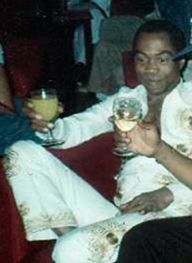
Fela Aníkúlápó Kútì, also famously known as Abàmì Ẹ̀dá, was a Nigerian musician, bandleader, composer, political activist, and Pan-Africanist. He is regarded as the King of Afrobeat, a Nigerian music genre that combines West African music with American funk and jazz. At the height of his popularity, he was referred to as one of Africa's most "challenging and charismatic music performers". AllMusic described him as "a musical and sociopolitical voice" of international significance.
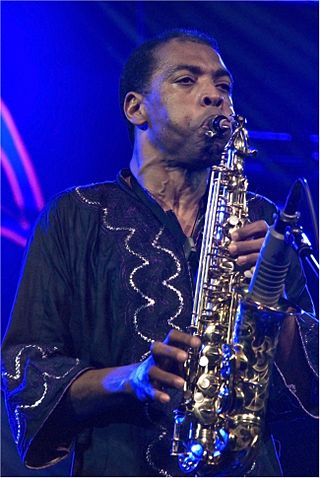
Olufela Olufemi Anikulapo Kuti, popularly known as Femi Kuti, is a Nigerian musician born in London and raised in Lagos. He is the eldest son of Afrobeat pioneer Fela Kuti and a grandchild of political campaigner, women's rights activist and traditional aristocrat Funmilayo Ransome-Kuti.

Red Hot + Riot is the fourteenth in a series of music compilation projects produced by Paul Heck and John Carlin of the Red Hot Organization and Grammy-winning music producer Andres Levin to be used as a fundraising tool for AIDS awareness efforts. The album, which takes inspiration from the late Nigerian musician Fela Kuti, was released by MCA on October 15, 2002 and featured more than three dozen artists on a score of tracks.
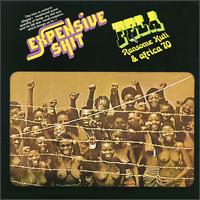
Expensive Shit is the twelfth full-length album by pioneering Afrobeat artist Fela Kuti and his Africa '70 band, released in 1975. It was reissued in 2000 by MCA Records, packaged with Kuti's He Miss Road (1975) on the same CD.

Oluseun Anikulapo Kuti, popularly known Seun Kuti, is a Nigerian musician, singer and the youngest son of Afrobeat pioneer Fela Kuti. Seun leads his father's former band Egypt 80.
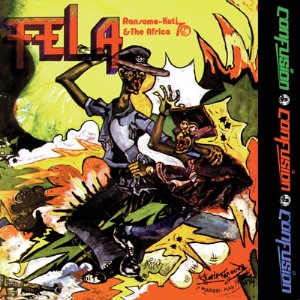
Confusion is a 1975 album by Nigerian Afrobeat musician Fela Kuti and his Africa 70 band. It was arranged, composed, and produced by Kuti, who recorded the album after choosing to emphasize his African heritage and nationalism in his music. Confusion is a commentary on the confused state of post-colonial Lagos and its lack of infrastructure and proper leadership at the time. Kuti's pidgin English lyrics depict difficult conditions in the city, including a frenetic, multilingual trading market and inextricable traffic jams in Lagos' major intersections.
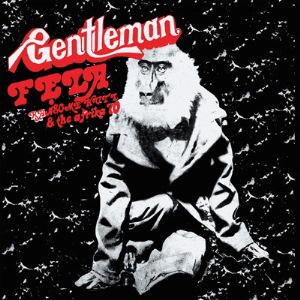
Gentleman is a 1973 studio album by Nigerian Afrobeat musician Fela Kuti. It was written and produced by Kuti and recorded with his Afrika 70 band. The cover artwork's depiction of a monkey's head superimposed on a suited body is a reference to the album's title track, which Kuti composed as a commentary on the colonial mentality of Africans who adhered to European customs and clothing.
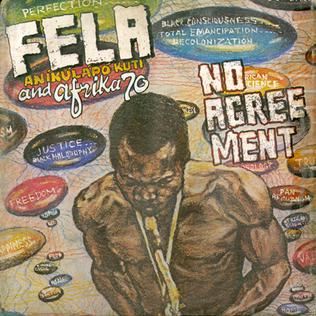
No Agreement is an album by Nigerian Afrobeat composer, bandleader, and multi-instrumentalist Fela Kuti, recorded in 1977 and originally released on the Nigerian Decca label.
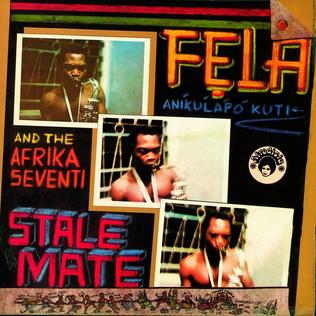
Stalemate is an album by Nigerian Afrobeat composer, bandleader and multi-instrumentalist Fela Kuti recorded in 1977 and originally released on the Nigerian Decca label.

Sorrow Tears and Blood is an album by Nigerian Afrobeat composer, bandleader, and multi-instrumentalist Fela Kuti recorded in 1977 and originally released on the Nigerian Kalakuta label.

Unknown Soldier is an album by Nigerian Afrobeat composer, bandleader and multi-instrumentalist Fela Kuti, recorded in 1979 and originally released on the Nigerian Skylark label.

Fela's London Scene is an album by Nigerian Afrobeat composer, bandleader, and multi-instrumentalist Fela Kuti, recorded in England in 1971 and originally released on the Nigerian EMI label.

Open & Close is an album by Nigerian Afrobeat composer, bandleader, and multi-instrumentalist Fela Kuti, recorded in Lagos in 1971 and originally released on the Nigerian His Master's Voice label.

Shakara is an album by Nigerian Afrobeat composer, bandleader, and multi-instrumentalist Fela Kuti, recorded in Lagos in 1971 and originally released on the Nigerian EMI label.

Roforofo Fight is an album by Nigerian Afrobeat composer, bandleader, and multi-instrumentalist Fela Kuti recorded in Lagos and originally released on the Nigerian EMI label Jofabro in 1972.

Afrodisiac is an album by Nigerian Afrobeat composer, bandleader, and multi-instrumentalist Fela Kuti, originally released on the Nigerian EMI label in 1973. The album's four tracks were re-recordings of Nigerian 45s redone in London in 1972. The album features Kuti's first Nigerian hit "Jeun Ko Ku," which sold over 200,000 copies.

L.I.F.E is the debut studio album by Nigerian singer Burna Boy. It was released on August 12, 2013, by Aristokrat Records. The album serves as the follow-up to his second mixtape Burn Identity (2011). L.I.F.E sold 40,000 copies on the first day of its release. Aristokrat Records later sold the album's marketing rights to Uba Pacific for ₦10 million. The album's release was preceded by five singles: "Like to Party", "Tonight", "Always Love You", "Run My Race" and "Yawa Dey".

Teacher Don't Teach Me Nonsense is a 1986 studio album by Fela Kuti and the Egypt 80.

Army Arrangement is a 1985 studio album by Fela Kuti.

Beasts of No Nation is an album by the Nigerian musician Fela Kuti. It was released in 1989. Kuti is credited with his band Egypt 80.




















